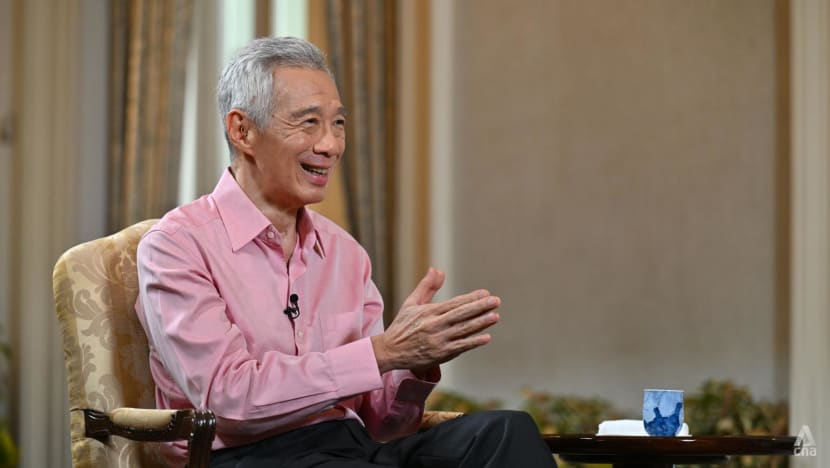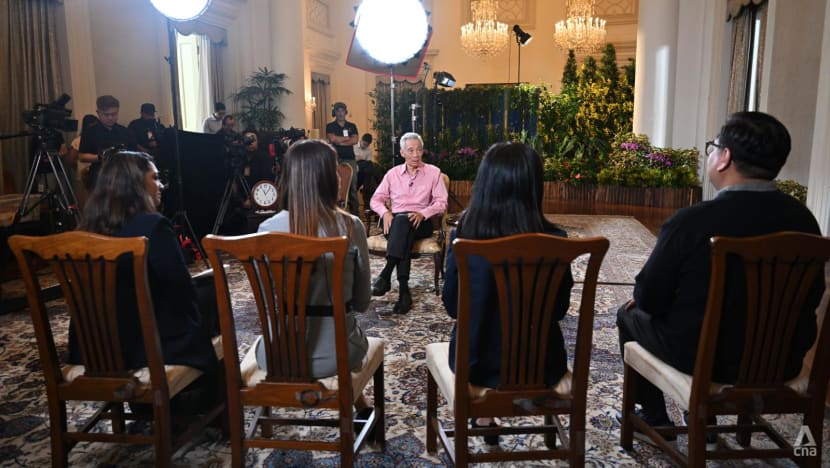Singapore has 'moved very far towards better social safety nets' over last 20 years, says PM Lee
In his 20-year tenure, the government has made a “very considerable” effort with policies such as ComCare for the needy and Workfare which focuses on low-wage workers, says Prime Minister Lee Hsien Loong.

After nearly 20 years heading Singapore’s government, Prime Minister Lee Hsien Loong will step down on May 15. (Photo: CNA/Jeremy Long)

This audio is generated by an AI tool.
SINGAPORE: Singapore has “moved very far towards better social safety nets” over the last 20 years, said Prime Minister Lee Hsien Loong.
For example, there was ComCare – launched in 2005 – which brought together existing social schemes to better serve those in need.
For lower-wage workers, Workfare was introduced in 2007 to supplement their incomes followed by the Progressive Wage Model in 2012 to ensure both wage and job progression.
Other efforts, Mr Lee said, include enhancing protections under MediShield Life – a mandatory insurance plan administered by the Central Provident Fund (CPF) that helps Singaporeans with hospital bills.
There is also CPF Life for retirement adequacy and CareShield Life, a national scheme for disability insurance rolled out in 2020, focusing on long-term care costs.
“These are all (the) things which we have done; all within the last 20 years. It is very considerable,” said Mr Lee, who has been Prime Minister since 2004.
“Of course, people will always say ‘Please do more’ and we will keep on improving.”
“IF YOU DO NOT HAVE THE MONEY, YOU CANNOT DO IT”
Mr Lee was speaking to the local media in his final interview as Prime Minister before he hands over the premiership to his deputy Lawrence Wong on May 15.
When asked what is stopping Singapore from moving towards a welfare state even as it seeks to become a more inclusive society, Mr Lee pointed to financial constraints as one factor.
“The restraint is if you do not have the money, you cannot do it. You may want it, you may think it is good but if you do not have the money, you cannot do it.”
Related:
Mr Lee cited the European welfare states, where government spending amounts to nearly half of gross domestic product and taxes are collected at a rate of 40 per cent of GDP.
This is on “a totally different scale” from Singapore, which collects 15 per cent of GDP in taxes and government expenditure being around “18 or 19 per cent” of GDP.
Adding that taxes in Singapore are “very low” compared to other countries, Mr Lee said: “In the developed countries (and) the welfare states, you are talking about 20 or 25 per cent of GDP, plus many other taxes on income, on wealth, sometimes on petrol, diesel, all sorts of things – otherwise how can you afford it?
“So, for us, the constraint is that if you cannot afford it and if you are not prepared to pay for it, then we cannot have it.”

That said, social welfare policies have to be adjusted from time to time.
“We have to do them, but we have to afford them,” said Mr Lee. “If we have to raise revenues in order to pay for them and raise taxes once in a while, we have to do that.”
This was why the Goods and Services Tax (GST) was raised from 7 to 9 per cent to cope with the “unavoidably” steady and sharp increases in healthcare spending, he said.
According to a paper published by the Finance Ministry last year, healthcare expenditure, excluding pandemic-related costs, is expected to increase from the current 2.3 per cent of GDP to about 2.9 to 3.5 per cent between 2026 and 2030.
This is on the back of an ageing population, higher utilisation of healthcare and medical inflation.
“The opposition will tell you to just take a bit more from the reserves; you will not go broke and you will not feel bad about raiding the bank,” Mr Lee said.
But the scale of spending by a welfare state – which is currently double or more than Singapore’s national expenditure – will deplete the reserves, he added, reiterating a point he made last year about how it would be the “biggest misconception” to think that the reserves will always be enough.
GOVERNMENT BEING THE “GATEKEEPER”
On the other hand, no political parties in Singapore believe in lowering taxes while cutting back on social welfare.
“That is not the PAP’s (People’s Action Party) policy. It is no opposition parties’ policy,” said Mr Lee, adding that this is unlike countries such as the US and Britain which have the Republican Party and the Conservative Party.
“In Singapore … you have no hope of forming a government saying less taxes, less welfare because we have made the country equal,” the Prime Minister said.
“The majority of Singaporeans are Singaporeans who are both paying taxes and enjoying the benefits. They are in the income groups which would say ‘Give me a bit more benefits, but do not tax me some more’.”
He said this puts the government under pressure to have more generous social safety nets, yet bearing in mind that too much may “dull the incentive to work” and create problems of how to pay for additional welfare benefits.
This means that the government has to be a “gatekeeper” in deciding how much more it is willing to pay in taxes to fund the social programmes.
“In the absence of a political restraint from a Conservative-type party, the government has to be … that gatekeeper and balancer.
“(It) has to judge what it is we must spend, what is it which we need to do, which social safety nets are necessary, how far should we go before we draw the line, what can we afford and what would be wise from the point of view of balancing between incentives to achieve and safety in case you fall upon hard times.”















.png?itok=71xMfv8X)







